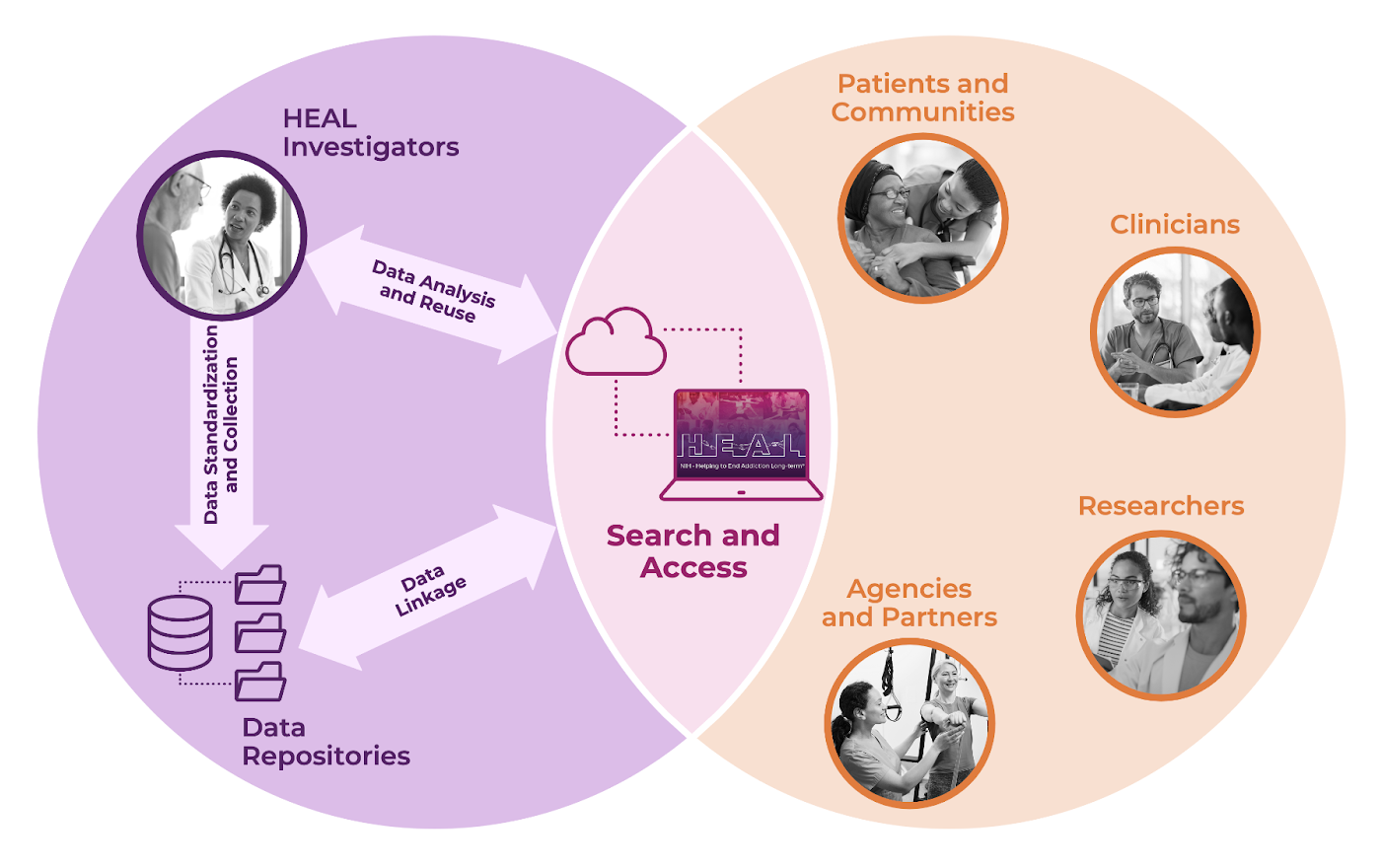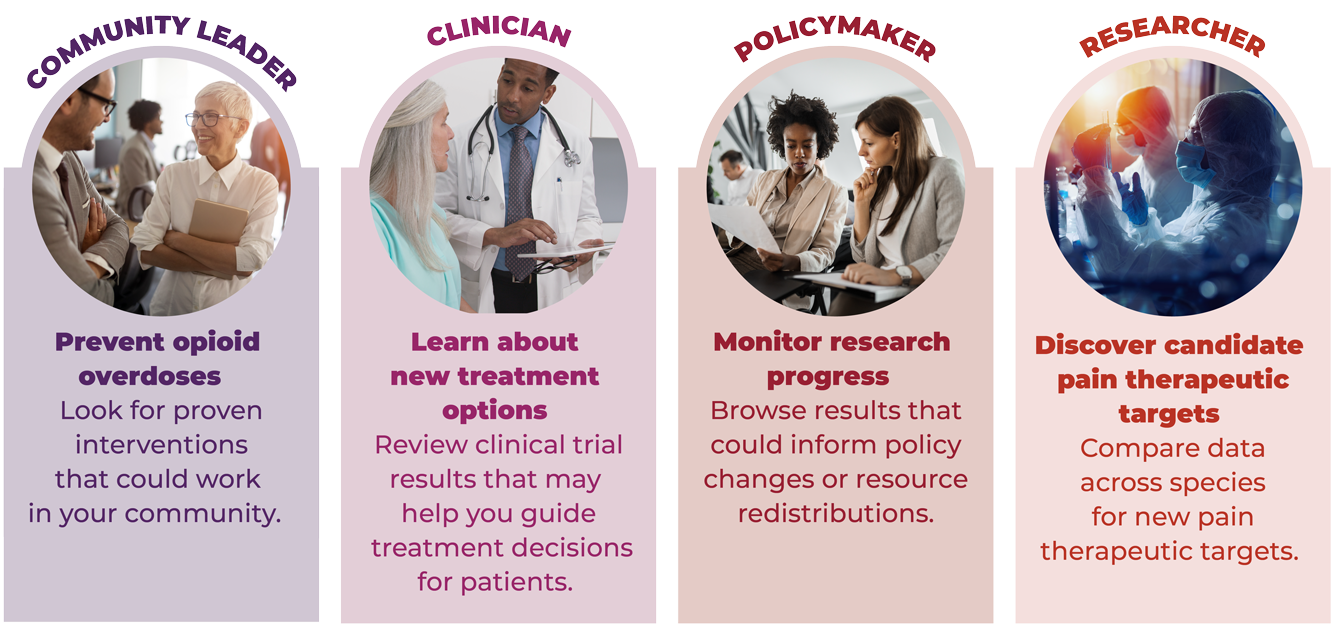About the HEAL Data Ecosystem
What Is the HEAL Data Ecosystem?
The HEAL Data Ecosystem is part of the Helping to End Addiction Long-term® Initiative, or NIH HEAL Initiative®, an NIH-wide effort to speed scientific solutions to stem the evolving national opioid public health crisis. The HEAL Data Ecosystem is made up of two tools and two support teams which support open science in HEAL, accelerating the sharing of HEAL-generated data and results among the broad community of researchers, healthcare providers, community leaders, policymakers, and other HEAL stakeholders who can benefit from learning the results of the initiative’s research. The HEAL Data Ecosystem connects the HEAL community, enabling HEAL data to be used to make discoveries and applied to benefit affected communities.

All HEAL data must be findable, accessible, interoperable, and reusable (FAIR, see HEAL Data Sharing Policy). This aligns with broader efforts across NIH, including the NIH Data Management and Sharing Policy that took effect in January 2023.
What Is the HEAL Data Platform?
The HEAL Data Platform provides a secure environment where users can search for and discover NIH HEAL-funded studies, as well as access and analyze data from those studies. The Platform connects to HEAL-compliant repositories where data are stored, providing a single point of access to the diverse array of studies and data funded by the NIH HEAL Initiative. The HEAL Data Platform offers a secure, STRIDES-enabled cloud computing environment for data analysis, providing researchers with easy access to powerful commercial and open-source software tools.
What Is HEAL Semantic Search?
The NIH HEAL Initiative also provides HEAL Semantic Search (HSS), an easy to use, concept-based search tool that connects information about HEAL studies and biomedical concepts. Unlike traditional keyword matching, HSS uses synonyms and concepts related to HEAL research to uncover connections between biomedical concepts found in studies’ metadata with those in biomedical ontologies. This expands the search facilities of the HEAL Data Platform, allowing users to deep dive into HEAL research and related biomedical topics to identify studies, datasets, and variables that might be of interest to them through unexpected relationships.
Using HEAL Semantic Search, users will be able to:
- Expand a search by looking at synonyms and related terms.
- Identify HEAL studies, variables, and Common Data Elements related to search terms and search results.
- Find out more about studies relevant to their research and identify potential collaborators.
- Identify gaps in existing research to develop unique research questions.
- Dive deeper into studies and variables of interest on the HEAL Data Platform.
How Will HEAL Data Help Address the Opioid Crisis?
Creating a Data Ecosystem
The HEAL Data Platform allows a broad range of stakeholders, including investigators, advocates, clinicians and community organizers, to easily find HEAL data and research results. Secure workspaces in the Platform provide user-specific space and software tools for analyses at any scale. Users can leverage the Platform to inform their own research, practice policies, and inquiries. There are many possible uses for HEAL data (see examples below).

As the HEAL Data Ecosystem grows, it will be possible to complete more complex searches and data analyses.
What HEAL-funded Research Teams Support the HEAL Data Ecosystem?
The HEAL Data Stewardship Group and the HEAL Data Platform Team collaborate with HEAL investigators on HEAL Data Ecosystem efforts. A Collective Board, with rotating members from various HEAL studies, guides the overall strategy and direction of the HEAL Data Ecosystem.
HEAL Data Stewardship Group
The HEAL Data Stewardship Group (HEAL Stewards) includes members from the Renaissance Computing Institute (RENCI) at UNC-Chapel Hill and RTI International. The HEAL Stewards support HEAL investigators with data management, data sharing, data standards, data analysis, repository selection, HEAL Data Platform registration, and more.
- Visit the HEAL Stewards’ Resources page for more information about selecting repositories, documenting metadata, sharing sensitive data, the Fresh FAIR webinar series, FAQs, and HEAL Semantic Search.
- Schedule a meeting or contact the HEAL Stewards to discuss your data management needs by submitting a Connect With Us form request.
HEAL Data Platform Team
The HEAL Data Platform team includes individuals from the University of Chicago. To connect with the HEAL Data Platform team for support registering your study, submitting metadata, and obtaining access to a cloud-based workspace, email heal-support@gen3.org.
You May Also Be Interested In:
Complying With the HEAL Data Sharing Policy
Learn about the groups funded to work with research teams throughout the HEAL Initiative to provide guidance in implementing FAIR data management and sharing practices.
Access the HEAL Platform
Visit the HEAL Platform to search for HEAL-funded studies, access and analyze data, and more.
 U.S. Department of Health & Human Services
U.S. Department of Health & Human Services
